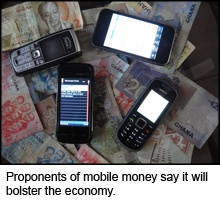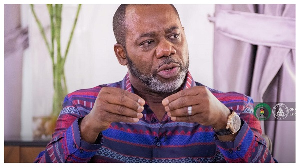The National Communications Authority (NCA) is in talks with the Bank of Ghana to find ways of enhancing mobile payments awareness, and also allow consumers to transfer cash from one mobile network provider to another.
This has become necessary because of the inability of mobile network operators to allow consumers to send money from one platform to another, which is one of the biggest challenges impeding efforts to push mobile payment to the front of the country’s financial system.
The Deputy-Director General of the NMC, Albert Enninful, explained that resolving the other issue of awareness will make it easier for an e-commerce and cashless payment platform to really work in the country.
“NCA, Bank of Ghana and the mobile network operators are in collaboration looking at mobile money business. There is a lot of work going on. Two things were identified: first interoperability and second awareness.
“So, part of the collaboration with the Bank of Ghana is to look at these two areas and see how the deficiencies can be taken care of. We are in collaboration with them, and hopefully we can get the push necessary to make mobile payment business common,” he said.
Currently, about half of the six mobile phone operators have introduced M-Commerce, otherwise known as ‘Mobile-Money’, to their operations as part of efforts to tap into markets previously considered unprofitable by financial institutions.
Other companies such as Afric Xpress and e-Transact Ghana, are also riding on the back of the mobile phone’s popularity with the country’s estimated 24.6 million population – offering various services that allow people to remit money to relatives and friends using the device.
e-Transact, MTN and Airtel Ghana- the three most popular mobile money services providers in the country – projected that as at last year the value of transactions on their e-Commerce platform would have exceeded GH¢500million since mobile money services began in the country a little over half a decade ago.
Nonetheless, there are concerns that the value of transactions made on mobile money platforms fall short of expectations as many people are unaware of such a facility to remit and make payments for goods and services.
The head of Ericson’s operations in the country, Andreas Karlsson, recently told the B&FT it will require some time for telecom operators to build on the critical elements that promote the uptake of mobile money services. “Compared to other countries like South Africa and Tanzania, there are some aspects – like trust, exposure and understanding of the mobile money-service- which make us think that Ghana needs a little more time to increase the rate of adoption for mobile-money services”, he said.
This view is shared by Dr. Robert Baffour, Vice-President of the Ghana Telecom University College, who said there is presently lack of trust among many people in mobile money payment systems – which must also be addressed. “You can get the infrastructure in place but if the people do not put their money in. Even in the US where electronic payment systems have caught on, people still do not trust the system,” he said.
Recent studies in the country by Visa International’s mobile money services platform, Fundamo, found that there are still significant barriers to adoption with two-thirds of the sampled population citing concerns about ease of use; 55% lack trust in providers and agents; and 28% cite a lack of interoperability with other mobile money services.
In addition, lack of accessibility, to mobile money agents, network reliability, communication and education appear to be major barriers.
Visa says that providers need to address these concerns by making sure their services are simple, have transparent fee structures, and have extensive agent networks in place.
Business News of Monday, 25 March 2013
Source: B&FT
NCA, BoG in talks over mobile payment systems

















